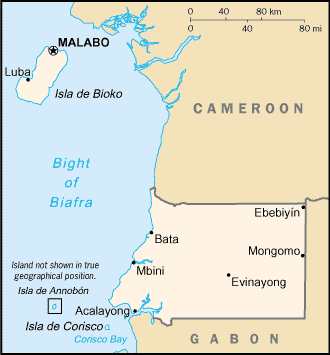 |
usa | world | animals | vocabulary | health | science | math | history |
Equatorial Guinea
This article is licensed under the GNU Free Documentation License. It uses material from the Wikipedia article "Equatorial Guinea ". Map Courtesy CIA World Factbook
Equatorial Guinea became officially independent from Spain on October 12, 1968. Since then, the country has had two leaders: Francisco Macías Nguema, the former mayor of Mongomo under the Spanish colonial government, and his nephew Teodoro Obiang Nguema Mbasogo, who staged a military coup d'état, executed his uncle, and has ruled since 1979. The 1982 constitution of Equatorial Guinea gives Obiang extensive powers, including naming and dismissing members of the cabinet, making laws by decree, dissolving the Chamber of Representatives, negotiating and ratifying treaties and calling legislative elections. Obiang retains his role as commander in chief of the armed forces and minister of defense, and he maintains close supervision of the military activity. The Prime Minister is appointed by the President and operates under powers designated by the President. The Prime Minister coordinates government activities in areas other than foreign affairs, national defense and security. On December 15, 2002, Equatorial Guinea's four main opposition parties withdrew from the country's presidential election. Obiang won an election widely considered fraudulent by members of the western press. According to a March 2004 BBC profile, politics within the country are currently dominated by tensions between Obiang's son Teodorin, and other close relatives with powerful positions in the security forces. The tension may be rooted in power shift arising from the dramatic increase since 1997 in oil production. A November 2004 report named Mark Thatcher as the financial backer of a March 2004 attempt to topple Obiang organized by Simon Mann.
|
 The Republic of Equatorial Guinea is a nation in central Africa, and one of the smallest countries in continental Africa. It borders Cameroon on the north, Gabon on the south and east, and the Gulf of Guinea on the west, where the islands of São Tomé and Príncipe lie to its southwest. Formerly the Spanish colony of Spanish Guinea, the country's territory (continentally known as Río Muni) includes a number of islands, including the sizable island of Bioko where the capital, Malabo (formerly Santa Isabel), is located. Its post-independence name is suggestive of its being situated near both the equator and the Gulf of Guinea.
The Republic of Equatorial Guinea is a nation in central Africa, and one of the smallest countries in continental Africa. It borders Cameroon on the north, Gabon on the south and east, and the Gulf of Guinea on the west, where the islands of São Tomé and Príncipe lie to its southwest. Formerly the Spanish colony of Spanish Guinea, the country's territory (continentally known as Río Muni) includes a number of islands, including the sizable island of Bioko where the capital, Malabo (formerly Santa Isabel), is located. Its post-independence name is suggestive of its being situated near both the equator and the Gulf of Guinea.